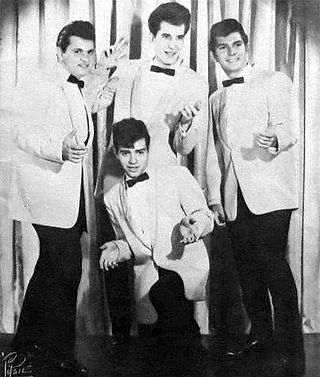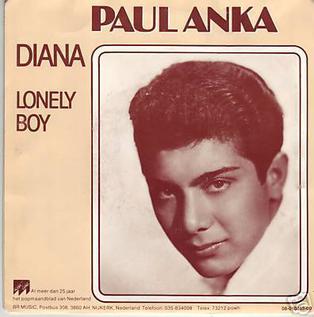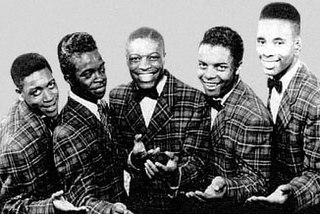Related Research Articles
Cameo-Parkway Records was the parent company of Cameo Records and Parkway Records, which were major American Philadelphia-based record labels from 1956 and 1958 to 1967. Among the types of music released were doo-wop, dance hits, popular/rock, rockabilly, big band, garage rock, soul and novelty records.

"Sh-Boom" is an early doo-wop song by the R&B vocal group The Chords. It was written by James Keyes, Claude Feaster, Carl Feaster, Floyd F. McRae, and William Edwards, members of The Chords, and published in 1954. It is sometimes considered the first doo-wop or rock 'n' roll record to reach the top ten on the pop charts, as it was a top-10 hit that year for both the Chords and The Crew-Cuts. In 2004, it was ranked No. 215 on Rolling Stone's "Top 500 Best Songs of All Time".
"I Believe" is a popular song written by Ervin Drake, Irvin Abraham, Jack Mendelsohn and Al Stillman in 1953. The most popular version was recorded by Italian-American singer Frankie Laine, and spent eighteen weeks at No. 1 on the UK Singles Chart.

The Diamonds are a Canadian vocal quartet that rose to prominence in the 1950s and early 1960s with 16 Billboard hit records. The original members were Dave Somerville (lead), Ted Kowalski (tenor), Phil Levitt (baritone), and Bill Reed (bass). They were most noted for interpreting and introducing rhythm and blues vocal group music to the wider pop music audience. Contrary to a popular myth, the father of Tom Hanks was never a member of the group.

The Earls, often credited as Larry Chance and the Earls, is an American popular music group formed in The Bronx, New York. In a career spanning over 60 years they formed in the early 1960s, though their roots can be traced back to 1957 in a group called the High-Hatters. They were one of the most accomplished white doo-wop groups of the early 1960s, especially in their home state of New York. In 1962, they became known for their signature hit single "Remember Then", which still remains a staple of doo-wop music. Later in their career they experienced moderate success with songs such as "Life Is But a Dream", "Never" and "I Believe". In the 1970s and 1980s, an oldies revival scene began and the Earls re-experienced success and became one of the most requested popular groups in the doo-wop genre. The group still continues to perform.

"Diana" is a song written and first performed by Paul Anka, who recorded it in May 1957 at Don Costa’s studio in New York City. Anka stated in his autobiography that the song was inspired by a girl named Diana Ayoub, whom he had met at his church and community events, and had developed a crush on. Session musicians on the record included George Barnes playing lead guitar, Bucky Pizzarelli playing the "Calypso" riff on guitar, Irving Wexler on piano, Jerry Bruno on bass, and Panama Francis on drums. The song was recorded in May 1957 at RCA Victor Studios in New York. Backup singers included Artie Ripp.
"It's the Talk of the Town" is a popular song written by Jerry Livingston, the lyrics by Al J. Neiburg and Marty Symes.

"Who Put the Bomp " is a doo-wop style novelty song from 1961 by the American songwriter Barry Mann, who wrote it with Gerry Goffin. It was originally released as a single on the ABC-Paramount label (10237).

"At the Hop" is a 1950s pop song written by Artie Singer, John Medora, and David White and originally released by Danny & the Juniors. The song was released in the fall of 1957 and reached number one on the US charts on January 6, 1958, becoming one of the top-selling singles of 1958. "At the Hop" also hit number one on the R&B Best Sellers list. Somewhat more surprisingly, the record reached #3 on the Music Vendor country charts. It was also a big hit elsewhere, which included a number 3 placing on the UK charts.
"A Woman in Love" is a popular song. It was written by Frank Loesser and published in 1955. It was introduced in Samuel Goldwyn's 1955 cinematic adaptation of the Broadway musical Guys and Dolls, for which Loesser contributed three new songs – including "A Woman in Love" – which had not been in the original stage production. In the film, it was sung as a duet between Marlon Brando and Jean Simmons. The cover version by Frankie Laine reached number 1 in the UK Singles Chart in 1956.
"Into Each Life Some Rain Must Fall" is a 1944 song performed as a duet by The Ink Spots, featuring Bill Kenny, and Ella Fitzgerald. Their recording was made on August 30, 1944 for Decca Records. The song was written by Allan Roberts (lyrics) and Doris Fisher (melody). The name of the song originates from a quotation of Henry Wadsworth Longfellow from the poem "Rainy Day". The song has also been included in the soundtrack for several videogames.

"Birth of the Boogie" is a 1955 song composed by Bill Haley with Billy Williamson and Johnny Grande. The song was released as a Decca single by Bill Haley and His Comets, peaking at #17 on the Billboard singles chart.
"Loving You" is a song written by Jerry Leiber and Mike Stoller and performed by Elvis Presley with backup vocals provided by The Jordanaires. It reached No. 15 on the U.S. country chart, #20 on the U.S. pop chart, and #24 on the UK Singles Chart in 1957. It was featured on his 1957 album Loving You. It was featured in Presley's 1957 movie Loving You. The single's A-side, "(Let Me Be Your) Teddy Bear" reached No. 1 on the U.S. pop, country, and R&B charts and #3 on the UK Singles Chart in 1957.
"Beyond the Blue Horizon" is a 1930 song composed by Leo Robin, Richard A. Whiting, and W. Franke Harling, and was first performed by Jeanette MacDonald in the 1930 film Monte Carlo. It was released that November as a single on a 78 rpm disc along with the song "Always, in All Ways" on Victor Records. Four takes were recorded on August 4 at the Hollywood Recording Studio, conducted by LeRoy Shield, with MacDonald and the vocal group The Rounders; the second take was chosen for release.

The Revels were an American doo-wop group formed in Philadelphia, Pennsylvania, in 1954. At first, the group bounced around different record labels earnings regional hits with tunes such as "Cha-Cha Toni" and "False Alarm", but national success initially eluded them. In 1959, however, the Revels charted at number 35 on the Billboard Hot 100 with "Midnight Stroll"—the act's only Top 40 hit.

Le migliori is an album by Italian singers Mina and Adriano Celentano, issued on 11 November 2016. The first single "Amami amami" was released on 21 October 2016. Le migliori was the best-selling album in 2016 in Italy. It sold more than 350,000 copies, getting the 7× Platinum certification in Italy.
"Sail Along, Silv'ry Moon" is a song written by Harry Tobias and Percy Wenrich in 1937 and performed by Bing Crosby. It reached #4 on the U.S. pop chart in 1937. Outside of the US, the song peaked at #1 in Canada, Germany and Norway.
"Send for Me" is a song written by Ollie Jones and performed by Nat King Cole featuring the McCoy's Boys. It reached No. 1 on the U.S. R&B chart and No. 6 on the U.S. pop chart in 1957. The song was arranged by Billy May.
"Soft Summer Breeze" is a song written and performed by Eddie Heywood. It reached No. 11 on the U.S. pop chart in 1956. The song was featured on his 1955 album, Eddie Heywood.
"Why Don't They Understand" is a song written by Jack Fishman and Joe Henderson and performed by George Hamilton IV. It reached #10 on the U.S. pop chart, #22 on the UK Singles Chart, and #18 in Canada in 1958.
References
- ↑ "The CASH BOX Best Selling Singles". www.cashboxmagazine.com. 1958-02-15. Archived from the original on 2012-08-07. Retrieved 2016-05-30.
- ↑ "The Diamonds, "The Stroll" Chart Positions" . Retrieved August 24, 2018.
- ↑ "Chart Toppers of 1958" Billboard December 15, 1958: 44
- ↑ "The Diamonds, The Diamonds Biography by Bill Dahl". AllMusic . Retrieved June 13, 2023.
- ↑ "Frankie Avalon, Frankie Avalon". Discogs . Retrieved August 24, 2018.
- ↑ "Leroy Kirkland's Rock-Chas, Strollin' the Cha Cha Cha" . Retrieved August 24, 2018.
- ↑ "Ken Mackintosh and His Orchestra, "The Stroll" Single Release" . Retrieved August 24, 2018.
- ↑ "Jack Pleis and Owen Bradley, Bandstand Hop". Discogs . Retrieved August 24, 2018.
- ↑ "Chubby Checker, It's Pony Time". Discogs . 1961. Retrieved August 24, 2018.
- ↑ "Brenda Lee, The Golden Decade". Discogs . January 1985. Retrieved August 24, 2018.
- ↑ "Adriano Celentano, Selection of Adriano Celentano". AllMusic . Retrieved August 24, 2018.
- ↑ "Jimmy Nalls, Ain't No Stranger". AllMusic . Retrieved August 24, 2018.
- ↑ "The Countdown Singers, Doo Wop". AllMusic . Retrieved August 24, 2018.